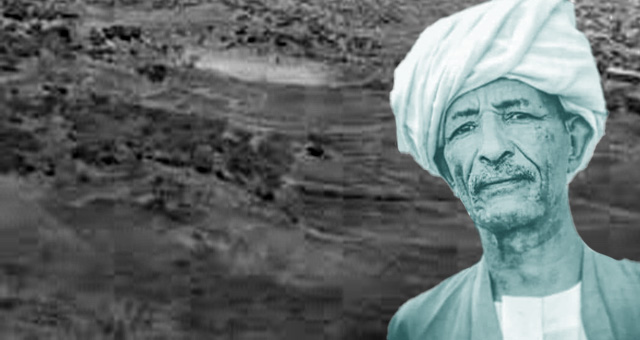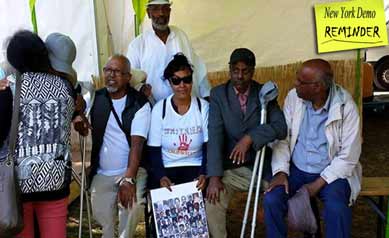A Response To Tesfabirhan Regarding Radio Blina
I would first like to appreciate Tesfabirhan Weldegabir, the writer of the article entitled “De-politicizing a program is politics: A case of Radio Blina”. The article was posted on May 4th, 2016 on awate.com. I would like to commend the writer for his efforts to strengthen the opposition cause and for recognizing the current neglect and hurt inflicted on the Blin (just like other communities) by the People’s Front for Democracy and Justice (PFDJ) regime. Yet, the article is filled with mistakes and some fallacious arguments which I believe need correction. I attempt to do that in this article.
As a program, Radio Blina was launched in the morning of November 1, 2014 by three dedicated Blin speakers residing in USA. Wasa! Wasa! Wasa! (meaning listen! Listen! Listen!) was the first word(s) used to announce the birth of this radio, a cultural annunciation that the Blin use to express their happiness and appreciation after eating Kala (porridge) and receiving blessings from the elderly during initiation rites. The use of a traditional expression was not without a purpose. It was meant to capture the mission of the radio program. Those words were not slogans in a political manifesto, but a clear indication that this radio will focus on revitalizing Blin culture and language. The birth annunciation was followed by clearly stated vision, mission, goals and objectives and its target population.
The clarity of mission and objectives from the outset has helped the radio program to win the support of tens of thousands of Blin speakers at home and in the Diaspora. Of course, the writer has miscalculated the number of followers of the program in his research. He completely ignored the fact that the program is also watched by families too whom the youtube website counts as one. The statistical data the writer presented also tell his ignorance of research methods. Your ignorance is not bliss for the people you are talking about and claim to be a member of.
Even worse, the core message of the article itself that a radio program rooted in the Diaspora has to be explicitly politicized given the current Eritrean reality is completely fallacious. The presence of a Bilin Radio program does not, in any way, preclude the birth of new viable opposition fora, or opposition organization for that matter. On the contrary, such radio programs cultivate community spirit which is a foundation for a cohesive, participatory and just society. It is that foundation that the PFDJ regime has succeeded to destroy. The regime knew that community spirit is a threat to its agenda and its very existence. If people start thinking of the wellbeing of others, they will definitely fight for change. That is what exactly Eritrean People’s Liberation Front (EPLF) fighters did. PFDJ officials, as former EPLF members, know that community spirit, can make people forget their own wellbeing and fight for the oppressed at any cost. The writer argues: “It is hard to imagine separate zones for culture and politics”. I wonder why it is hard for him to see this thread of connection.
I believe, the PFDJ regime has in many ways succeeded in shaping people’s ideas about what is just and justice, acceptable and unacceptable, nationalistic and unnationalistic…etc. Hence, it is not surprising to see people, like the aforementioned writer, fail to appraise things in a comprehensive way and avoid presenting the kind of arguments PFDJ officials make to justify their oppression of Eritrean society. The PFDJ clique has for decades believed that nation building and national security cannot be achieved without injustice. That means, citizens have to suffer in dungeons denied of justice, that the regime has to rule the country without a constitution, and that citizens have to resort to unjust means and unjustifiable measures to get their rights. This twisted understanding of society and politics has even invaded the very ‘enlightened’ of our society. I find the consequences of that invasion in the writer’s words: A program contrary to reality is valueless and non-representative. Translated in plain English, a radio program of any kind should always be politicized. That is what the writer means. Sport programs, comedy and any other radio program founded by Eritrean community abroad should be politically motivated. I don’t get the logic in this. It is a complete fallacy. Besides, the writer seems to have forgotten the concept of right. I believe any community in the Diaspora has the right to form a civil society or forum of its choice. Why should a community be criticized for exercising its right while living in a democratic society? Is that because we were only bound to duty at home? Yes, military generals like Sibhat Ephrem and PFDJ officials have instilled in many of our psedo-intellectuals the idea that asking your right is unnationalistic. PFDJ officials have been repeating, as parrots, the famous saying of Lord Acton: “Ask what you can do for your country not what your country can do for you”. By repeating this saying and creating their own context, they have partly succeeded in creating a misguided group of citizens.
As an innocent citizen, I often tried to make sense of PFDJ ideology and decisions made and conclusions reached by PFDJ officials. And the hardest thing for me was understanding the criteria used to grade people’s nationalism. Needless to say, one of the silly criteria is related to ethnic connectedness and disconnectedness. For example, if a person from the minority ethnic groups has a friend from his ethnic group at a work place and spends much time with him/her, he/she is not a nationalist. The more disconnected one is from members of their own ethnic group, the more nationalist they are, and the more connected, the less their ‘score’ of nationalism. On the contrary, this criteria does not apply to Tigrigna speakers spending time together; they get the passing mark for free. The current writer seems to have sought asylum somewhere in the West with a box of ill-logics unconsciously learned from PFDJ officials. He needs to learn and see meaningful and logical connections between things.
I am not unmindful of the constructive role of media in national discourse, however. Media is a fourth organ of government, or a separate fourth organ if a government like ours hijacks it at home. Yet, a radio program which exclusively broadcasts the political views and opinions of a single ethnic group does more harm than good to the national cause or opposition cause. I say this in view of the current ‘balkanized’ Eritrean Diaspora. The Diaspora opposition groups have lost their compass. They continue to mix up religion and politics, ethnicity and politics, regionalism and politics, cultural and politics and achieving almost nothing for the national good. In such a situation, the form of contribution has to change, and that is what exactly Radio Blina is doing; using the media for laying down the foundation for community spirit. Bravo Radio Blina!
Let me be clear about this issue. I do not intend to sanction silence or neutrality in this article because silence is no more golden. As Marting Luthar King said in relation to the Civil Rights Movement in the United States, “Our lives begin to end the day we become silent about things that matter”. To give life to anti-PFDJ movement, everybody has to participate. I support active involvement for changing the current sad situation in the country. This is not only my belief and understanding. Most Blin believe in that and are doing their best. They actively participate and even lead opposition groups and fora. The presence of a radio program, Radio Blina, has not discouraged Blin speakers from playing their role and should not be taken as an obstacle in the struggle. Not explicitly politicizing a radio program is not politics in itself.
The writer of the article travelled back and forth in time to make his point; to justify that the Blin were/are not active players in politics and issues that matter. He even cites internal problems as among the causes for the ineffectiveness of the Blin to challenge occupation and injustice. Although the role of history is undeniable, it is my conviction that history does a great harm to intra-communal and national discourse if not handled with caution and with a long-term goal of building the future. If we keep on looking back to justify our current weaknesses, as a community and as a nation, we will travel nowhere. That is one of the weaknesses of the regime we are trying to fight against. It has taken pride in history and refused to move forward. In so doing, it has blocked the road for others. The writer seems to be in the company of the PFDJ clique in his misuse of history.
The Blin have travelled past history. Whether you call their language ‘endangered’ and the community divided, it is stronger than it was before a hundred, thirty or twenty years. The community is now marching to their bright future. And it continues to build its culture without ignoring and endangering national unity, as some communities do. I wish other communities could follow the lead of the Blin.
The core problem with groups formed in the Diaspora today is lack of unity. For those of us who live in the Diaspora, especially those who actively use the media to fight against the authoritarian regime in Eritrea, it is imperative that we think of creating a united front that can help us look forward. We need to think of including and uniting the nine ethnic groups and different religious groups, and build a common understanding among the Diaspora, not narrate the individual histories and irrelevant historical realities of communities that make up Eritrea today. Disparate voices will not give us direction. The ideas the writer presented in the article about Radio Blina and opposition strategy are a recipe for more confusion in the anti-PFDJ struggle. It is better to refrain from explicit engagement if views and opinions do not contribute to a united voice for the oppressed.




Awate Forum